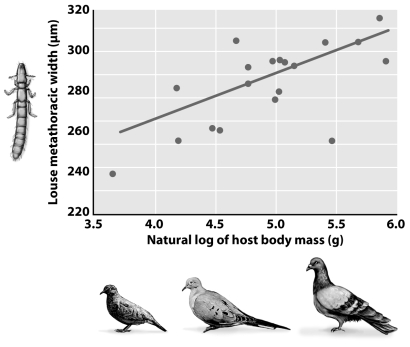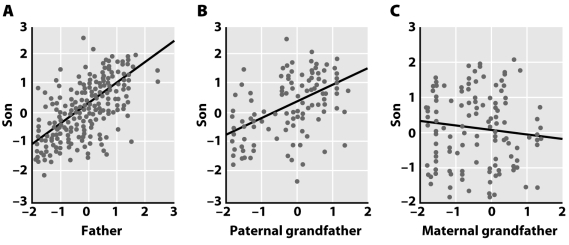Exam 19: Coevolution
Exam 1: An Overview of Evolutionary Biology40 Questions
Exam 2: Early Evolutionary Ideas and Darwins Insight43 Questions
Exam 3: Natural Selection45 Questions
Exam 4: Phylogeny and Evolutionary History43 Questions
Exam 5: Inferring Phylogeny47 Questions
Exam 6: Transmission Genetics and the Sources of Genetic Variation43 Questions
Exam 7: The Genetics of Populations42 Questions
Exam 8: Evolution in Finite Populations38 Questions
Exam 9: Evolution at Multiple Loci39 Questions
Exam 10: Genome Evolution38 Questions
Exam 11: The Origin and Evolution of Early Life42 Questions
Exam 12: Major Transitions42 Questions
Exam 13: Evolution and Development39 Questions
Exam 14: Species and Speciation37 Questions
Exam 15: Extinction and Evolutionary Trends25 Questions
Exam 16: The Evolution of Sex32 Questions
Exam 17: Sexual Selection23 Questions
Exam 18: The Evolution of Sociality31 Questions
Exam 19: Coevolution26 Questions
Exam 20: Evolution and Medicine27 Questions
Select questions type
Why do we distinguish between inter- and intraspecific mutualism?
Free
(Multiple Choice)
5.0/5  (33)
(33)
Correct Answer:
B
Define "cultural transmission" in one sentence.
Free
(Essay)
4.9/5  (25)
(25)
Correct Answer:
The transfer of information between individuals through social learning or teaching
Geographically isolated subpopulations of a species can evolve partial reproductive isolation.If two subpopulations come into secondary contact,they can either become one mixed population,or,during a process called reinforcement,selection may lead to greater reproductive isolation.The latter will occur if mating between subpopulations results in hybrid offspring that have lower fitness.Could cultural evolution play a role in reinforcement?
Free
(Multiple Choice)
5.0/5  (35)
(35)
Correct Answer:
A
Suppose that Epicephala moths are part of a larger group of moths whose members are all seed feeders,but none of the other seed-feeding genera are involved in the pollination of their host plant.What would you conclude to be the most parsimonious pathway for the evolution of the mutualistic relationship between Epicephala and Glochidion plants?
(Multiple Choice)
4.8/5  (37)
(37)
Which of the following is a relationship between organisms that cannot evolve into a mutualistic relationship?
(Multiple Choice)
4.8/5  (29)
(29)
Clayton and colleagues discovered the relationship between feather-louse size and the body mass of their corresponding bird hosts illustrated in the figure below.What do the authors hypothesize about the mechanism of cospeciation in doves and lice from this relationship? 
(Multiple Choice)
4.8/5  (31)
(31)
When researchers examined the effects of withholding nitrogen from Bradyrhizobium japonicum,they used a "split root" treatment in which half of a soybean plant's root mass received gaseous nitrogen,whereas the other half did not.Why did the researchers use this split root treatment?
(Multiple Choice)
4.9/5  (30)
(30)
Which of the following differs between intra- and interspecific interactions when it comes to the evolution and maintenance of cooperation?
(Multiple Choice)
4.8/5  (37)
(37)
How did Lutzoni and Pagel conclude that the entire genome of mutualistic fungi evolved faster than the genome of free-living fungi?
(Multiple Choice)
4.8/5  (31)
(31)
What ecological role were the nitrogen-fixing Bradyrhizobium japonicum bacteria in soybean root nodules effectively playing when the experimenters cut off gaseous nitrogen?
(Multiple Choice)
4.8/5  (30)
(30)
Describe the mosaic theory of coevolution in your own words.Limit your answer to one sentence.
(Essay)
4.8/5  (34)
(34)
Provide one likely cost and one likely benefit for each of the mutualistic partners in the Iridomyrmex ant and imperial blue butterfly caterpillar relationship.
A.Benefit for ants:
B.Cost for ants:
C.Benefit for caterpillars:
D.Cost for caterpillar:
(Essay)
4.8/5  (27)
(27)
Some species of tropical fireflies mimic the luminescent mating signals of females of a related species and will prey upon the males that have been attracted by the fake signal.How would you classify this behavior? Is it Batesian mimicry,Müllerian mimicry,a third form of mimicry,or no mimicry at all? Briefly justify your answer.
(Essay)
4.9/5  (38)
(38)
Why do woodland star flowers likely abort flower heads with Greya moth eggs in geographic locations where other nonflower-feeding pollinators are present?
(Multiple Choice)
4.9/5  (27)
(27)
The apple host race (or biotype)of the Rhagoletis pomonella fruit flies evolved after apples were colonized by individuals of R.pomonella's hawthorn race (hawthorn is the original host of R.pomonella).If the two R.pomonella races become two different species over time,would this represent an example for cospeciation? Briefly justify your answer.
(Essay)
4.8/5  (34)
(34)
Is there an alternative (genetic)explanation to cultural evolution for the correlation in songs of Darwin finches and their sons and grandsons? (The units on the x- and y-axes summarize multiple components of the finches' songs.) 
(Multiple Choice)
4.8/5  (41)
(41)
Why does cultural transmission have the potential to be faster than genetic transmission? Limit your answer to one sentence.
(Essay)
4.8/5  (31)
(31)
Briefly define the three modes of cultural transmission: vertical cultural transmission,horizontal cultural transmission,and oblique cultural transmission.
(Essay)
4.9/5  (39)
(39)
Showing 1 - 20 of 26
Filters
- Essay(0)
- Multiple Choice(0)
- Short Answer(0)
- True False(0)
- Matching(0)